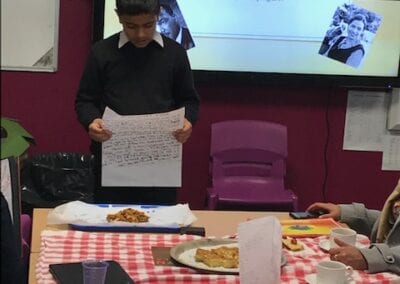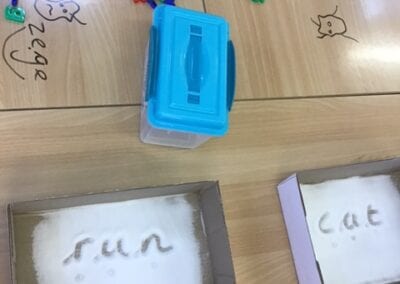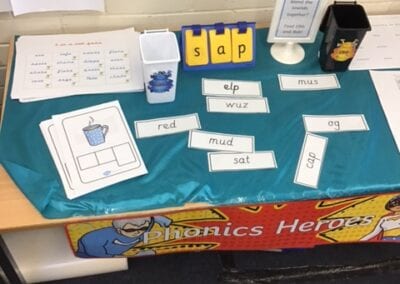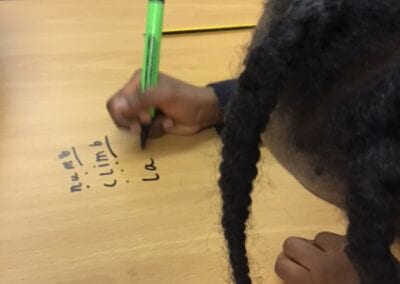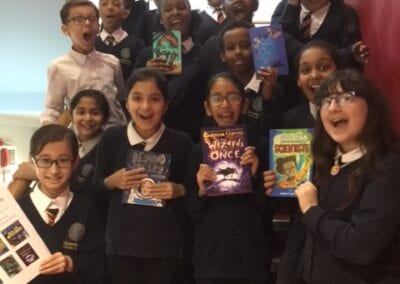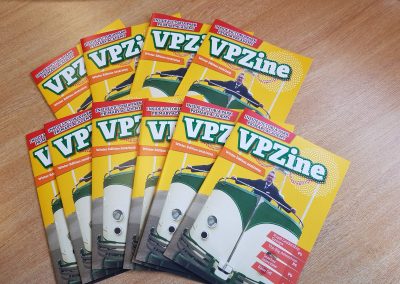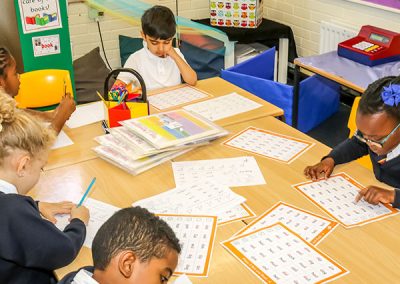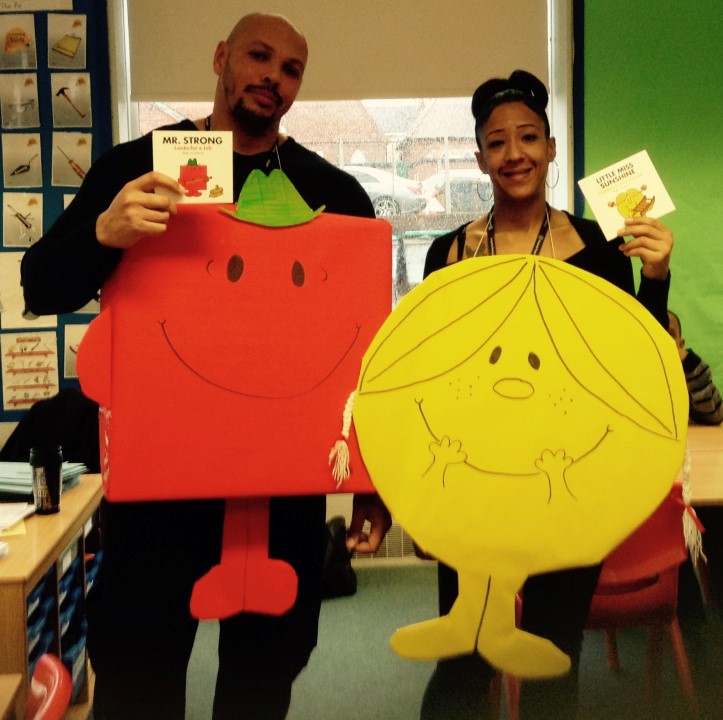ENGLISH
English (Writing):
Vision: Throughout school, children will develop and refine their understanding of and ability to write for a variety of purposes and audiences through a range of text types/ genres.
Children will be taught not only the relevant knowledge and skills for their year group, but also to use it deliberately and purposefully to achieve an intended effect. Furthermore, this is complemented through continual challenge to grow and extend their vocabulary.
What we teach: Our progression of learning aligns to the National Curriculum. Declarative knowledge and procedural skills are broken down into each year group and then further into challenge packs so that they can be embedded and deepened at each stage.
In the foundation stage, the focus is on developing positive writing habits, with children focussing on their gross and fine motor skills, before learning how to accurately grip a pencil, form letters correctly and then begin to apply their phonics to write words and sentences.
As they transition to Year 1, children will then focus on the structure and features of a sentence before beginning to create extended writing.
In each Key Stage children focus on different purposes:
KS1 – Writing to Entertain and Inform
LKS2 – Writing to Entertain, Inform and Persuade
UKS2 – Writing to Entertain, Inform, Persuade and Discuss
Writing links to learning in NICER and Reading lessons. This is to ensure that children develop a wider understanding of the topic/ content that they are writing about, so that they have more opportunities to practise and refine their use of new vocabulary/ language. It also allows children to focus on the craft and composition of their writing more so than the content itself.
Throughout school, children will be taught the writing process which begins by examining features and skills they have previously learnt within the text type that they are studying. They will then learn and practise new skills (or deepen their understanding of existing skills) that will allow them to better achieve the purpose and effects. This is underpinned by exploring model examples and identifying them in their wider reading, which occurs throughout the process.
After children have had the opportunity to practise these skills, which will include creating a shared write with the teacher, they will then plan their writing. The final stage of the process is the composition which incorporates drafting, editing and revising their work.
What learning looks like: In all classes, you will see the ‘boxed criteria’ displayed and in use on working walls. This grows and develops as children move through the writing process so is continually dynamic and evolving.
The teaching and learning approach will vary depending upon which part of the writing process children are working at. Where new knowledge and skills are being developed, a progressive structure to differentiation will be utilised to ensure that children are supported
and challenged at all stages. High quality oracy strategies and purposeful opportunities for talk will also be central to learning.
Writing – Added extras:
Alongside our English Writing lessons, children also benefit from the following:
Everybody Write Days – where children in all years write about the same stimulus based on an exciting event in school such as a visit from an Olympian or a British Values themed poetry slam.
Author Visits – As part of our VPA commitment children will receive a visit from an author each year to inspire their love of writing.
Writing Clubs – A creative writing club is ran for KS2 children.
Publish writing – Also part of our VPA commitment; children in LKS2 will develop and create a piece of writing that will be published. Parents will have the option to purchase the book but school will also buy copies for classrooms.
Trips and experiences – Trips and experiences are a carefully considered part of our curriculum offer. They ensure that we provide cultural capital for all children which supports children to produce writing rooted in rich content.
Reading
VPA Home Reading Guidance 2020
Vision: At Victoria Park, we aim to encourage a lifelong love of reading. In order to achieve this, children are exposed to a wide range of genres linked to their NICER curriculum. They have access to reading materials through both an inviting class library and a whole school library, and teachers who promote a passion for reading. We intend for our pupils to be both independent and reflective readers who can read fluently for both educational purposes and also for pleasure. From the early stages of learning Phonics and phonetical skills, we promote a positive approach to teaching reading. We aim that children use a variety of reading skills to enable them to access all other areas of learning. We also aim to bring reading to life and give it a purpose.
What we teach: In Early Years and Key Stage 1, we have implemented a DfE accredited scheme called Rocket Phonics which aims for all children to keep up not catch up. It is a systematic, synthetic Phonics program which fully aligns all sounds from Reception up to and including Year 2. It is language-rich and has practical, skill-based booklets to allow children to practice and embed the sounds taught.
In Key Stage 2, we use the VIPERS scheme. This is an acronym for six different reading domains needed for children to know and understand in order to improve their comprehension of text. These include vocabulary, inference, prediction, explanation, retrieval and sequence or summarise.
What learning looks like: All Phonics lessons take place on a daily basis. Within the Rocket Phonics scheme, there are straight-forward but thorough lesson plans which allow children to recap previous sounds and be exposed to new sounds. The lessons allow children to practice segmenting and blending taught sounds. Alongside the taught sounds, children are given books which are fully-decodable according to their stage on the Rocket Phonics scheme.
In VIPERS lessons within Key Stage 2, children are taught key VIPERS skills at the beginning of the week. The children are then exposed to close reading where they are provided opportunities to fully understand and comprehend the text. Children are also provided with comprehension questions which incorporate six reading domains.
Added extras: All children, from Reception to Year 6, are provided with a home-reader which is appropriately chosen for their Reading level. They can also access a reading for pleasure book (chosen by themselves).
All classrooms at Victoria Park have their own class library. These libraries include texts linked to their challenge packs and also books that children can access for pleasure, eg. Comics, picture books and graphic novels.
Book webs have been curated for each year groups challenge pack. These books are linked to their challenge pack and include a range of fiction, non-fiction, picture books and graphic novels.
We also have a range of diversity books which are linked to each year groups PSHE curriculum. These books are shared as and when appropriate.
At Victoria Park, we have an expectation that every class has a class reader that is read daily. This text is chosen by the children via a Book World Cup. The books within the Book World Cup have been chosen by the Reading leads to ensure that they are appropriate and of high quality.
We have a developing school library which is full of high quality and diverse books. Children had the opportunity to explore these books through a book tasting session on World Book Day. These include graphic novels, poetry books, adventure stories and non-fiction texts.
Every year we celebrate our schools love of reading on World Book Day. The focus of this day is solely to share our passion for reading by completing a range of activities throughout the day. So far these have included book tasting, book world cup where new class reads are chosen, masked reader and class/teacher swaps.

